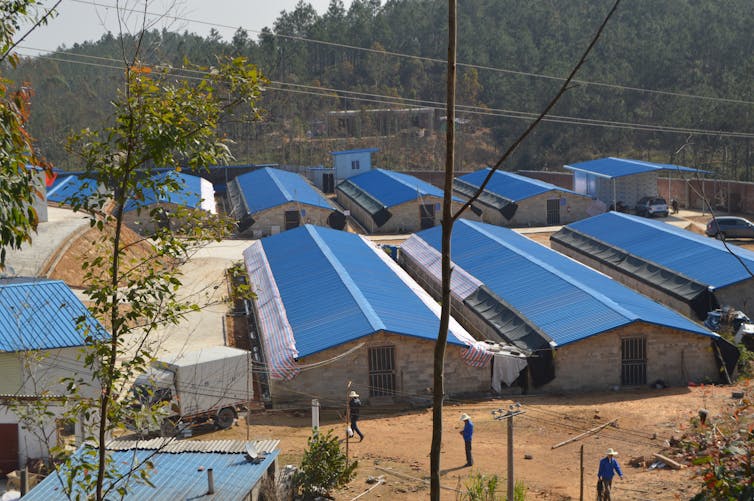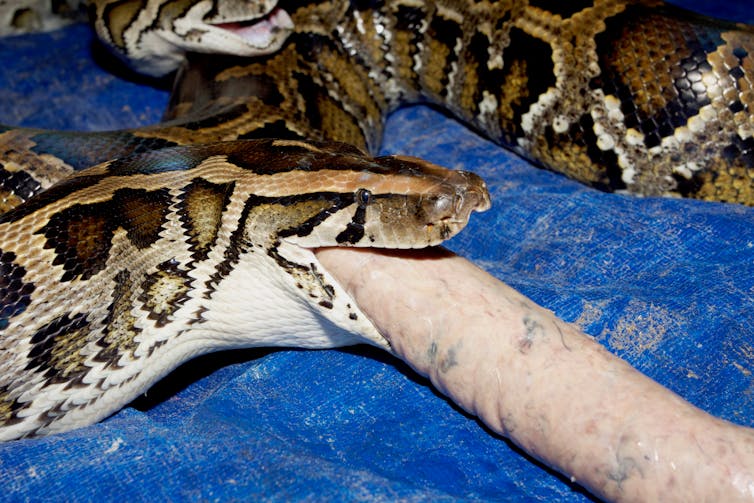Snakes make good food. Banning farms won't help the fight against coronavirus
- Written by Daniel Natusch, Honorary Research Fellow, Macquarie University
The wildlife trade has long been closely linked to disease outbreaks[1]. It has been implicated in the SARS epidemic of 2002, Ebola in 2013 and now in the COVID-19 coronavirus.
In response to the COVID-19 outbreak, China has tentatively banned[2] the farming of many wildlife species. The move has been celebrated by many in the international community.
But our work in Asia[3] over the past ten years tells a different story. Banning legitimate snake farms might prove counterproductive to disease suppression.
Though snakes were early suspects[4] as the source of the Wuhan coronavirus, reptiles have never been linked to any of the World Health Organisation’s top ten [5]infectious diseases which pose the greatest threat of epidemics.
Snakes are different
One reason is straightforward. Snakes are cold-blooded (more correctly “ectothermic”) and have a very different physiology to humans. Viruses co-evolve highly specialised relationships[6] with their hosts and are often species-specific.
Occasionally, a chance mutation might allow a virus to infect another species, but the more different the new and old hosts are to each other, the less likely that is.
Compared with transmission between mammals, or even from birds to mammals, the probability of a virus crossing from a cold-blooded reptile to a warm-blooded human is remote[7].
In parts of Asia where H5N1-type viral outbreaks such as bird and swine flu are now endemic[8], hundreds of snake farmers rely on waste protein such as pork and poultry by-products as feed.
Read more: How to feed nine billion people, and feed them well[9]
Disease outbreaks regularly wreak havoc[10] with conventional livestock industries but never, to our knowledge, with snake farming.
In this context, reptiles represent a natural biological barrier to viral diseases.
They enable farmers to build financial resilience through diversity[11], dampening the many risks associated with livestock monocultures.
And the benefits don’t end there.
They’re tailor-made for sustainability
Commercial snake farming has developed rapidly in China. The first experimental farms were set up in 2007; by 2019 the industry was producing large-scale high-quality protein.
Some snakes have highly desirable agricultural traits including rapid growth, early maturation and rapid reproduction. They are comparatively simple cognitively, and do not suffer the complex behavioural stresses seen in many caged birds and mammals.
Many are semi-arboreal, spending time in trees, allowing farms to maximise available space.
 A modern snake farm. Apart from the suntraps (specialised basking areas flanking the barns), it looks like any other commercial livestock farm.
Patrick Aust, Author provided (No reuse)
A modern snake farm. Apart from the suntraps (specialised basking areas flanking the barns), it looks like any other commercial livestock farm.
Patrick Aust, Author provided (No reuse)
They do require a high-protein diet but, since their cold-blooded metabolic demands are very low (less than 10% of similar-sized mammals), food can be more directly channelled to growth.
The energy efficiency[12] is achieved mainly by employing solar energy (e.g., basking) to drive metabolic processes, and by powerful digestive systems[13] capable of breaking down even bone.
It means they produce low volumes of biological waste and greenhouse gases, and require minimal fresh water.
Read more: China’s growing footprint on the globe threatens to trample the natural world[14]
Chinese snake farms rely on two principal sources of feed inputs: waste protein from agricultural food chains, and natural prey such as harvested rodents.
This means they both recycle agricultural waste[15] and control economically important rodent pests[16].
 Snake farmers use ‘snake sausage’ byproducts from the pork and poultry industries.
Daniel Natusch, Author provided (No reuse)
Snake farmers use ‘snake sausage’ byproducts from the pork and poultry industries.
Daniel Natusch, Author provided (No reuse)
Their cold-blooded physiology allows them to survive[17] for considerable time without food and water – far longer than similarly-sized warm blooded animals.
This allows farmers to effectively exploit seasonal abundances during times of plenty, and downscale inputs[18] during times of famine.
Snake farming therefore provides a resilient livelihood in the face of economic volatility and the extremes of Climate Change.
It would be a shame if concern about coronavirus snuffed out an industry that is unlikely to be the problem, but could very well be a solution.
References
- ^ disease outbreaks (www.ncbi.nlm.nih.gov)
- ^ banned (www.scmp.com)
- ^ our work in Asia (www.cambridge.org)
- ^ snakes were early suspects (theconversation.com)
- ^ top ten (origin.who.int)
- ^ specialised relationships (science.sciencemag.org)
- ^ remote (www.sciencedirect.com)
- ^ endemic (www.who.int)
- ^ How to feed nine billion people, and feed them well (theconversation.com)
- ^ wreak havoc (e.vnexpress.net)
- ^ diversity (theconversation.com)
- ^ energy efficiency (www.researchgate.net)
- ^ digestive systems (www.jstor.org)
- ^ China’s growing footprint on the globe threatens to trample the natural world (theconversation.com)
- ^ recycle agricultural waste (theconversation.com)
- ^ rodent pests (www.sciencedirect.com)
- ^ survive (link.springer.com)
- ^ downscale inputs (www.climatecouncil.org.au)
Authors: Daniel Natusch, Honorary Research Fellow, Macquarie University







